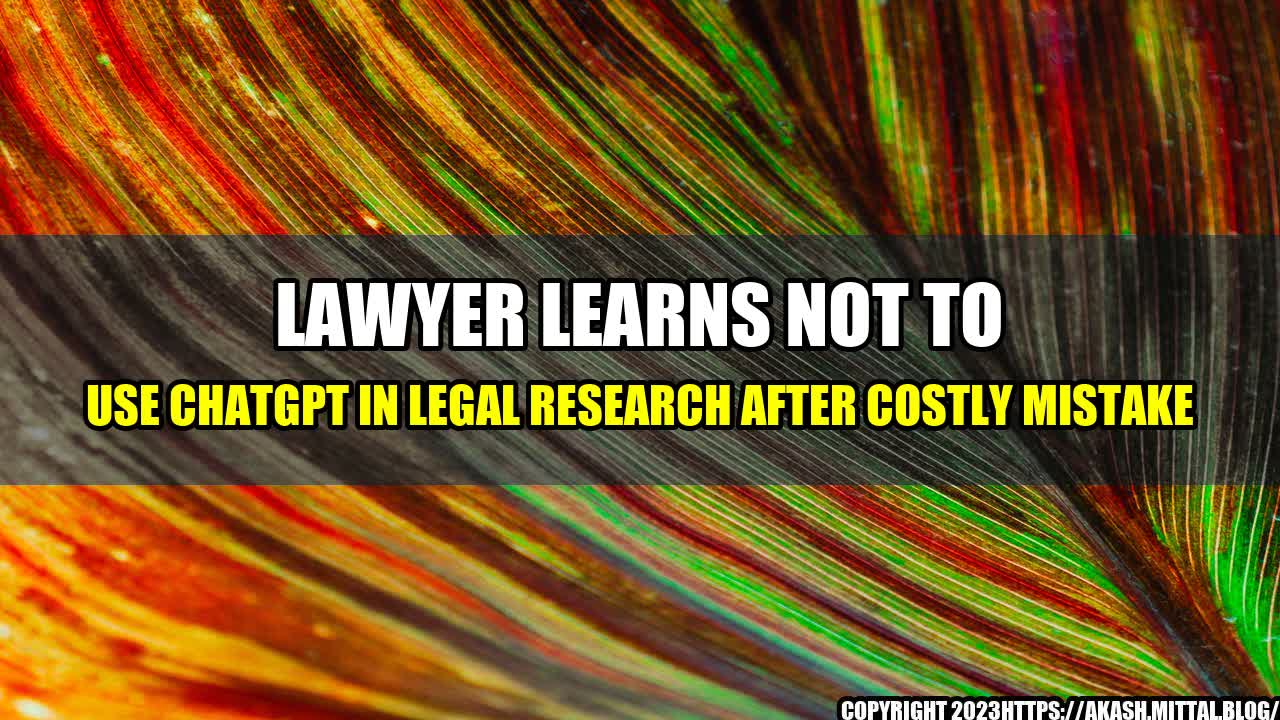Lawyer Learns Not to Use ChatGPT in Legal Research After Costly Mistake


Lawyer John Smith had been practicing law for more than 15 years. He had seen countless cases, handled a wide variety of legal issues, and won many battles in court. However, his world was recently turned upside down when he made a costly mistake in his legal research by relying on ChatGPT.
John was working on a case for a client who had been injured in a car accident. He was conducting legal research on the internet to find out more information about similar cases, in order to build a strong case for his client. While exploring various websites, he stumbled upon ChatGPT, an AI-based customer service platform that promised to provide instant and accurate answers to legal questions.
Excited by the prospect of saving time and effort, John decided to use ChatGPT to find legal information related to his case. He entered his query into the chatbot and waited for the response. Within a few seconds, he received an answer that seemed to be relevant to his case. Satisfied with the information, he continued working on his case, unaware of the mistake he had just made.
Fast forward a few weeks, and John found himself in court, arguing his client's case. To his shock, the judge asked him about the legal information he had obtained using ChatGPT. John confidently answered, relying on the information he had received from the platform. However, the judge wasn't convinced. After cross-checking the information, he found that the details John had provided were inaccurate and outdated. The judge ruled against John's client, leaving John and his client devastated.
The mistake that John made by using ChatGPT was very costly. He not only lost his client's trust but also his reputation as a competent lawyer. The judge ruled against him, making it clear that relying on an AI-based platform for legal research was not a wise decision. John had to bear the consequences of his mistake, which not only affected his professional life but also his personal life.
John's mistake highlights the dangers of relying on AI-based platforms for legal research. While these platforms promise quick and accurate answers, they are not always reliable. The information provided by these platforms may be outdated, incomplete, or inaccurate, leading to costly mistakes like John's.
Legal research requires in-depth analysis and understanding of legal concepts and precedents. AI-based platforms may not be able to provide this level of analysis, leading to misinterpretation of legal concepts and incorrect conclusions. Lawyers must exercise caution and rely on trusted sources for legal research to avoid costly mistakes.
John's mistake underscores the importance of reliable sources for legal research. Lawyers must rely on trusted sources, such as legal databases, books, and articles, to find accurate and up-to-date legal information. They must also exercise caution when using online platforms, such as ChatGPT, and cross-check the information to ensure its accuracy.
Using reliable sources for legal research not only helps lawyers avoid costly mistakes but also enables them to build a strong case for their clients. Legal research is a fundamental part of a lawyer's job, and using trusted sources is essential to providing clients with the best legal representation possible.
John's mistake serves as a cautionary tale for lawyers who may be tempted to use AI-based platforms for legal research. While these platforms may seem convenient and offer quick answers, they are not always reliable. Lawyers must exercise caution and rely on trusted sources for legal research to avoid costly mistakes like John's. Using reliable sources not only helps lawyers avoid mistakes but also enables them to provide the best legal representation possible.
Curated by Team Akash.Mittal.Blog
Share on Twitter Share on LinkedIn